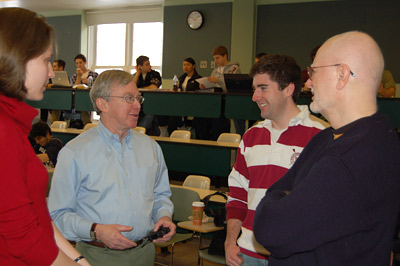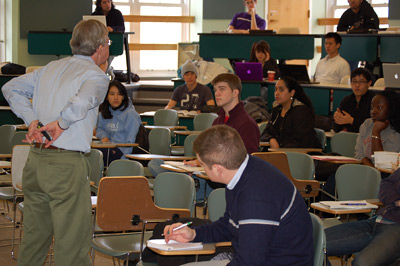Students gain insights from noted economist
By Ted Boscia


During the week of Feb. 22-26, Cornell graduate and undergraduate students in economics learned at the side of Robert Moffitt, the Krieger-Eisenhower Professor of Economics at Johns Hopkins University and a leading expert on the economics of welfare reform.
In an hourlong session Feb. 22 with 20 graduate students from economics, applied economics and management, and policy analysis and management (PAM), Moffitt, chief editor of the American Economic Review, shared advice for researching and writing dissertations and gaining the attention of journal editors and readers. As an Institute for the Advancement of Economics at Cornell "distinguished visitor," h e urged students to present their work publicly, as a way to defend their findings and refine their economic models.
"He gave very practical advice for doing research and preparing your dissertation and covered many of the key points to economic research," said Joshua Price, a fifth-year Ph.D. student in PAM. "He's been the editor or co-editor at three of the top four economic journals in the U.S., so it's really valuable to hear from him about how the publishing process works as many of us are preparing for the job market."
Later in the week, Moffitt lectured about welfare reform in PAM assistant professor Emily Owens' undergraduate course, "Economics of the Public Sector." He showed how changes to such federal subsidy programs as Temporary Assistance for Needy Families and the Earned Income Tax Credit during the past 20 years have altered the flow of benefits to the poor. While expenditures on the working poor have risen, Moffitt said, the extremely poor or those unable to work have seen government subsidies decline.
"His talk was very informative, especially to see how taxpayer money is actually spent on these programs," said PAM major Joe Bailey '12. "I was surprised by how little is spent on the very poor, that they're not getting as much today as they did in the 1980s."
"It is very important to have these types of debates and discussions in class," said Joaquin Cuevas, a senior in the ILR School who asked Moffitt numerous questions about wealth redistribution. "It would be great to have more opportunities to do so."
Moffitt also spoke to the Cornell community on "Trends in the Transitory Variance of Male Earnings in the U.S., 1970-2004." The Department of Policy Analysis and Management in the College of Human Ecology organized Moffitt's visit, which was sponsored by the Institute for the Advancement of Economics (IAEC) at Cornell.
"The IAEC has started a visitor program with the goal of bringing economists of the very highest stature to campus in order to enrich the intellectual environment for students and faculty," said Michael Waldman, IAEC director and Charles H. Dyson Professor of Management in Cornell's Johnson School. "Robert Moffitt is an internationally well-known labor economist and applied micro-econometrician who we believe brings numerous insights for undergraduate students, graduate students and faculty during his weeklong stay at Cornell."
Ted Boscia is assistant director of communications in the College of Human Ecology.
Media Contact
Get Cornell news delivered right to your inbox.
Subscribe